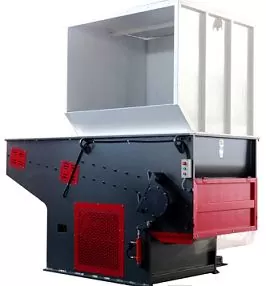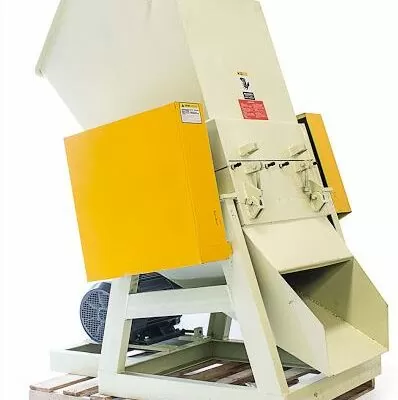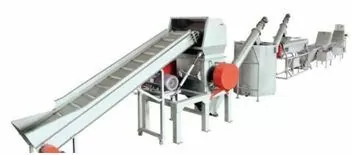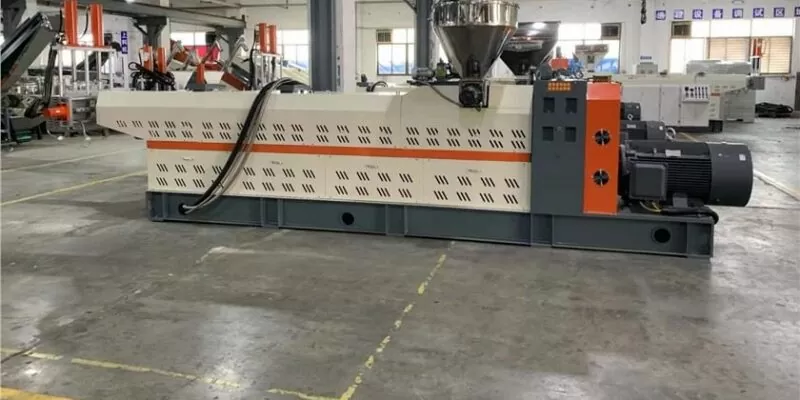What is the state of the plastic crushing industry amid global environmental pollution?
I remember the days when environmental pollution was merely a distant headline. I faced the harsh reality of overflowing landfills and polluted waterways. I felt the pain of wasted resources and a planet under siege. At Amige, I knew there had to be a solution. The plastic crushing industry emerged as a beacon of hope. It promised to turn waste into opportunity. I embarked on a mission to understand how this industry could reshape our future.
The plastic crushing industry plays a pivotal role in addressing global pollution. By converting discarded plastics into reusable materials, it supports recycling and sustainable practices. Countries worldwide are adopting this technology to combat pollution and promote green innovation. Our journey at Amige has shown me the transformative potential of plastic crushing, and I am excited to share our insights.
I have witnessed firsthand how environmental challenges differ across borders. Every country has its unique pollution narrative. Some struggle with urban smog, while others grapple with plastic waste choking coastal areas. I see the global tapestry of challenges and opportunities. It’s a complex picture. Yet, plastic crushing offers a silver lining. It brings tangible solutions to mitigate these issues.
Across nations, policies vary. Some governments invest heavily in recycling. Others lag due to economic constraints. This variation creates diverse markets for the plastic crushing industry. My role as CEO at Amige has taught me to adapt our strategies for each locale.

How do different countries face environmental pollution?
I often compare global pollution challenges to a patchwork quilt. Each piece, or country, has its distinct design. In industrialized nations, strict regulations and modern technologies prevail. They invest in research and development to curb emissions and improve recycling processes. Countries like Germany and Japan set benchmarks for environmental management.
In contrast, developing countries often battle with limited resources. Their infrastructure may not fully support advanced recycling technologies. Rapid industrialization and urban growth exacerbate pollution. I see potential here. With targeted investments and smart strategies, these regions can leapfrog into sustainable practices.
What challenges do we face with plastic waste management?
Plastic waste is a global headache. Every day, millions of tons of plastic end up in landfills, oceans, and incinerators. I’ve seen how mismanaged waste affects communities. The health impacts are real. Wildlife suffers, and human lives are compromised. This is the problem we need to solve.
Plastic waste management is complicated by collection inefficiencies, lack of recycling infrastructure, and public awareness issues. In many regions, outdated systems hinder proper disposal and processing. The plastic crushing industry steps in by breaking down waste into manageable forms. It is a vital cog in the recycling machine.
I am always struck by the sheer volume of plastic waste produced. Urban centers, especially in rapidly growing countries, are overwhelmed. I remember visiting a city where plastic bags and bottles littered the streets. The sight was both disheartening and motivating. It was a call to action for industries like ours. Every piece of plastic has potential when processed correctly.
At Amige, we invest in technology to enhance plastic crushing efficiency. Our machines reduce plastic waste into reusable material with minimal energy consumption. This transformation is not just technical—it is a step towards a cleaner future.

How does plastic crushing contribute to sustainability?
Plastic crushing is more than a recycling process. It’s an enabler of a circular economy. I believe in turning waste into wealth. By crushing plastics, we recover valuable raw materials. This recycled material feeds back into the manufacturing cycle. It reduces the need for virgin plastic production. This is sustainable and economically smart.
I see plastic crushing as a win-win solution. It lowers environmental footprints and generates business opportunities. Companies can reduce costs by reusing materials. Meanwhile, governments can lower landfill usage and pollution levels. I am proud to say that our technology at Amige is at the forefront of this revolution.
Sustainability is achieved through innovation and persistence. The plastic crushing industry exemplifies this. It converts waste into reusable pellets, which manufacturers then transform into everyday products. This closed-loop system minimizes resource extraction and environmental degradation. Embracing plastic crushing means investing in a greener future.
Every day, I remind myself that innovation is our best tool against environmental decay. The plastic crushing process is continuously evolving. We see improvements in energy efficiency and material quality. The industry is rapidly advancing. Every upgrade brings us closer to a truly sustainable model. I am excited to be a part of this change.
Furthermore, governments are starting to incentivize recycling technologies. This boosts industry growth. With better support, plastic crushing can scale globally. I believe we are on the brink of a green industrial revolution.
What innovations are driving the plastic crushing industry forward?
Innovation is at the heart of our work. At Amige, I encourage a culture of continuous improvement. We constantly experiment with new techniques. These innovations help us overcome technical challenges and increase efficiency. Advanced sensors now monitor every aspect of the crushing process. Automation minimizes human error and maximizes throughput.
’m thrilled about the integration of AI in our systems. Predictive maintenance and real-time quality control are game-changers. They ensure our machines perform at peak efficiency. The benefits are clear: less downtime, better product quality, and lower operational costs.
Modern materials also play a role. New composite materials can be processed with greater ease. They offer higher durability and better recycling properties. I see this as a golden era for the industry. Every breakthrough redefines what is possible in plastic crushing.
The digital transformation of manufacturing has been phenomenal. I have seen firsthand how data analytics optimizes machine performance. This approach reduces waste and energy consumption. Every insight drives us towards perfection. I’m committed to leading these technological advancements at Amige.
Moreover, the collaboration between tech companies and recycling firms is on the rise. Cross-industry partnerships foster creative solutions. They pave the way for smarter, more sustainable processes. The synergy is remarkable.

What regulatory challenges impact the industry?
Government policies can make or break an industry. Regulations on waste management and recycling are evolving rapidly. I keep a close eye on legislative trends across the globe. In many developed nations, strict environmental laws push for higher recycling rates. These policies benefit the plastic crushing sector.
In contrast, some regions face lax regulations. The absence of stringent policies often leads to inefficient waste management. I have seen countries struggling with outdated practices. This creates uneven playing fields. Our challenge is to advocate for better standards globally. I believe in the power of smart regulation to drive positive change.
avigating regulatory challenges is complex. It requires active dialogue with policymakers and industry stakeholders. I often participate in forums and think tanks. Together, we brainstorm ways to harmonize regulations with technological capabilities. Regulatory bodies are gradually recognizing the value of plastic crushing.
I understand that policy shifts take time. The path to global standardization is slow and winding. However, I remain optimistic. Our industry’s potential to improve environmental outcomes is undeniable. Each regulatory hurdle is a chance to refine our approach and innovate further.
Collaborating with governments is essential. We share best practices and technical data to support policy reforms. My experience has shown that well-informed regulations spur industry growth. This mutual benefit drives a sustainable future.
How is the plastic crushing industry evolving in different regions?
Regional differences are striking. I have visited Europe, Asia, and America to witness firsthand the varied approaches to recycling. In Europe, there is a strong emphasis on sustainability. Governments and industries work hand in hand. Strict standards and high recycling targets are the norm.
In Asia, rapid industrialization has created enormous waste challenges. However, innovative solutions are emerging. Countries like China and India are investing heavily in advanced recycling facilities. Their focus is on scalability and efficiency. I have been impressed by the dynamism in these markets.
In America, the landscape is diverse. Some states lead with robust recycling programs. Others are still finding their footing. This regional diversity creates opportunities for targeted interventions. I see a future where tailored solutions address local challenges. Each region’s evolution is a lesson in resilience and innovation.
We at Amige adapt our technology for each market. Our systems are flexible. They can be customized to meet regional specifications and environmental demands. This adaptability is our strength.
What are the economic impacts of the plastic crushing industry?
The economic benefits are substantial. By turning waste into resources, we create new value chains. I have seen economies transform as local recycling sectors grow. Job creation, reduced waste management costs, and lower dependence on raw materials are just a few benefits.
Investments in plastic crushing technology drive innovation. They lead to more efficient production and cost savings. I personally enjoy seeing a project come full circle—from idea to implementation to measurable impact. The returns are not just financial. They extend to environmental and social realms as well.
The plastic crushing industry fuels economic growth. It creates jobs in manufacturing, research, and logistics. Moreover, it reduces the environmental burden on communities. When local governments and businesses invest in this technology, everyone wins. Our success at Amige is a testament to these benefits.
I am proud of the role we play in this economic transformation. Our innovations have attracted investors. They see the potential for high returns coupled with environmental impact. It’s a win-win situation. We are not just generating profits—we are fostering sustainable development.
Furthermore, the export potential is significant. Regions with advanced recycling capabilities can become suppliers of recycled materials worldwide. This global trade in recycled plastics is a game-changer.

What future trends should we expect in the plastic crushing industry?
The future is bright. I see several key trends emerging. First, automation will continue to dominate. Intelligent systems will optimize every process step. Second, the integration of renewable energy will reduce operational costs and environmental impact.
Third, we will witness further advances in material science. New polymers and composites will offer improved recyclability. Fourth, global collaborations will become the norm. Countries and companies will work together to set universal standards. The industry is moving toward greater harmonization and efficiency.
Emerging trends indicate a paradigm shift in plastic recycling. Digitalization, sustainability, and global partnerships will define the next decade. At Amige, we are investing heavily in R&D to stay ahead. Our goal is to lead the industry into a greener and more prosperous future.
I often think about how far we have come. The journey from rudimentary crushing machines to smart, automated systems is remarkable. Yet, this is just the beginning. I am excited by the endless possibilities that lie ahead. Every challenge is an opportunity for innovation.
The shift towards a circular economy is inevitable. As global awareness of environmental issues increases, the demand for sustainable practices will grow. I am confident that the plastic crushing industry will continue to evolve.
Conclusion
The plastic crushing industry is pivotal in combating global pollution. It transforms waste into resources, fuels economic growth, and drives sustainability. With innovation and smart policies, we can build a greener future for all.
